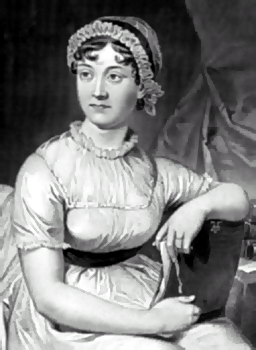 |
 |
|||
|
|
 Jane
Austen (1775-1817) Jane
Austen (1775-1817)Born: 16th December 1775 at Steventon, Hampshire Authoress Died: 18th July 1817 at Winchester, Hampshire "Novels ..
performances which have only genius, wit and taste to recommend them" Jane Austen was born in the village of Steventon, Hampshire in 1775, within five years of Wordsworth and Scott. She was the seventh of eight children. Her father, George, had been a Fellow of St. John's College, Oxford and lately Rector of Steventon. Her mother, Cassandra, nee Leigh, came from an ancient family, linked to the Leighs of Stonehill Abbey in Warwickshire. Jane and her sister, also Cassandra, were sent to school in Oxford and Southampton, before attending the Abbey School in Reading, and were encouraged to write from an early age. Jane started writing novels in 1790, at the age of only 14, while she was living in Steventon, although her first novel to be published, Sense and Sensibility, did not appear until 1811. Although her early life appeared secure enough, it was touched by tragedy. Her cousin, Eliza Hancock, married a French nobleman, who was arrested and guillotined on his return to Paris soon after the French Revolution. Her aunt, Mrs. Leigh Perrot, was arrested when falsely accused of stealing a card of lace, and suffered eight months imprisonment with the threat of the death penalty, before she was able to prove her innocence. On her father's retirement, in 1801, the family moved to Bath. Jane's years at Bath were not happy. The family made acquaintances, but few friends. Their stay at Bath was broken up by annual excursions to the seaside: to Sidmouth, Dawlish and Lyme Regis. As was the custom, the sons of the family pursued careers (two of Jane's brothers joined the Navy), while the daughters stayed at home, awaiting marriage and involving themselves with domestic affairs. A neighbour from their Hampshire days, Harris Bigg-Wither of Manydown Park (Wootton St. Lawrence) asked Jane to marry him in the Winter of 1802. Though she initially accepted, a sleepless night saw the poor man turned down the following morning. In several of Jane's letters from Bath to her sister, Cassandra, one senses her frustration at this sheltered existence. Tuesday, 12 May 1801. "Another stupid party ...with six people to look on, and talk nonsense to each other". Some time after the death of Jane's father in 1805, the family left Bath to stay with Jane's brother, Frank, who was stationed at the Naval Dockyard, in Southampton. Jane's brother, Edward, had been formally adopted by a rich and childless relative, which led to his elevation as a country gentleman. Cassandra had been sent to assist with his domestic arrangements at Godmersham Park, near Canterbury. He also owned Chawton House, Hampshire and in 1809 offered a home to his mother and sisters on the estate there. The family settled happily and it was here that Jane was to enjoy the success of the publication of her first novel. Initially, the secret of their authorship was kept, the author being referred to only as "a lady", but later, her proud brother, Henry, let it be known and she became instantly famous. Her last completed novel, Persuasion, was not published until after her death. By the time of its completion, she was seriously ill and not expected to live. During the last few weeks of her life, she lived in College Street, Winchester, to be close to her physician. She died in Cassandra's arms in Winchester at the age of 41. The family exercised the right, as members of a clergyman's family, that she should be buried in Winchester Cathedral. Today, the museum at Chawton is visited by Jane Austen admirers from across the Globe. There are many mementoes of her life on display. Jane's mother and her beloved sister, Cassandra are buried in the churchyard. The Novels "Sense and Sensibility":
published 1811 Jane Austen started to write at a time when the Romantic Movement was expressing its passionate involvement with the landscape, in particular, the melancholic aspects of gothic ruins, and the natural world in general. She was one of the few writers to adopt an irreverent attitude to this obsession. Edward Ferrars, speaking to the impressionable Marianne, in "Sense and Sensibility", admits his confusion when attempting to describe a picturesque landscape and when Henry Tilney decides to lecture on the picturesque to Catherine, in "Northanger Abbey," she "was so hopeful a scholar that when they gained the top of Beechen Cliff, she voluntarily rejected the whole city of Bath, as unworthy to make part of a landscape". In many ways, Jane Austen's detached, ironic style was an antithesis of the Romantic ideal. Many people have commented on the modernity of her novels. Elizabeth Bowen in English Novelists (Collins, 1946), suggests this comment is "an agreeable way of saying that she is still some distance ahead of us". She followed in the wake of the success of Fielding and Richardson and her sense of comedy and style has been likened to that of Fielding. She is noted for the precision of her observations. Her attention to detail is a means to enlighten a subject. As Elizabeth Bowen notes, "she applies big truths to little scenes".
|
|||
| © Nash Ford Publishing 2001. All Rights Reserved. | ||||


